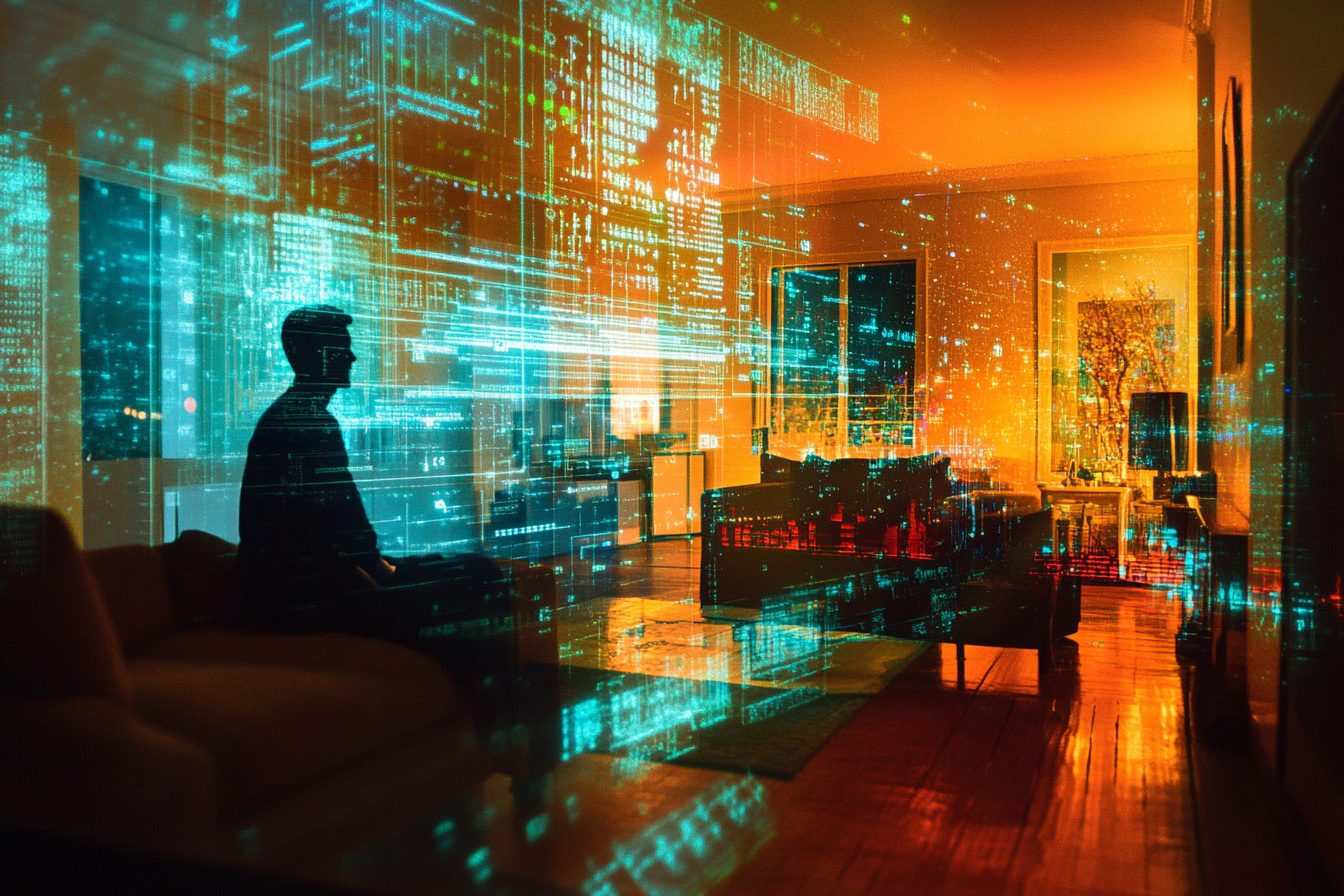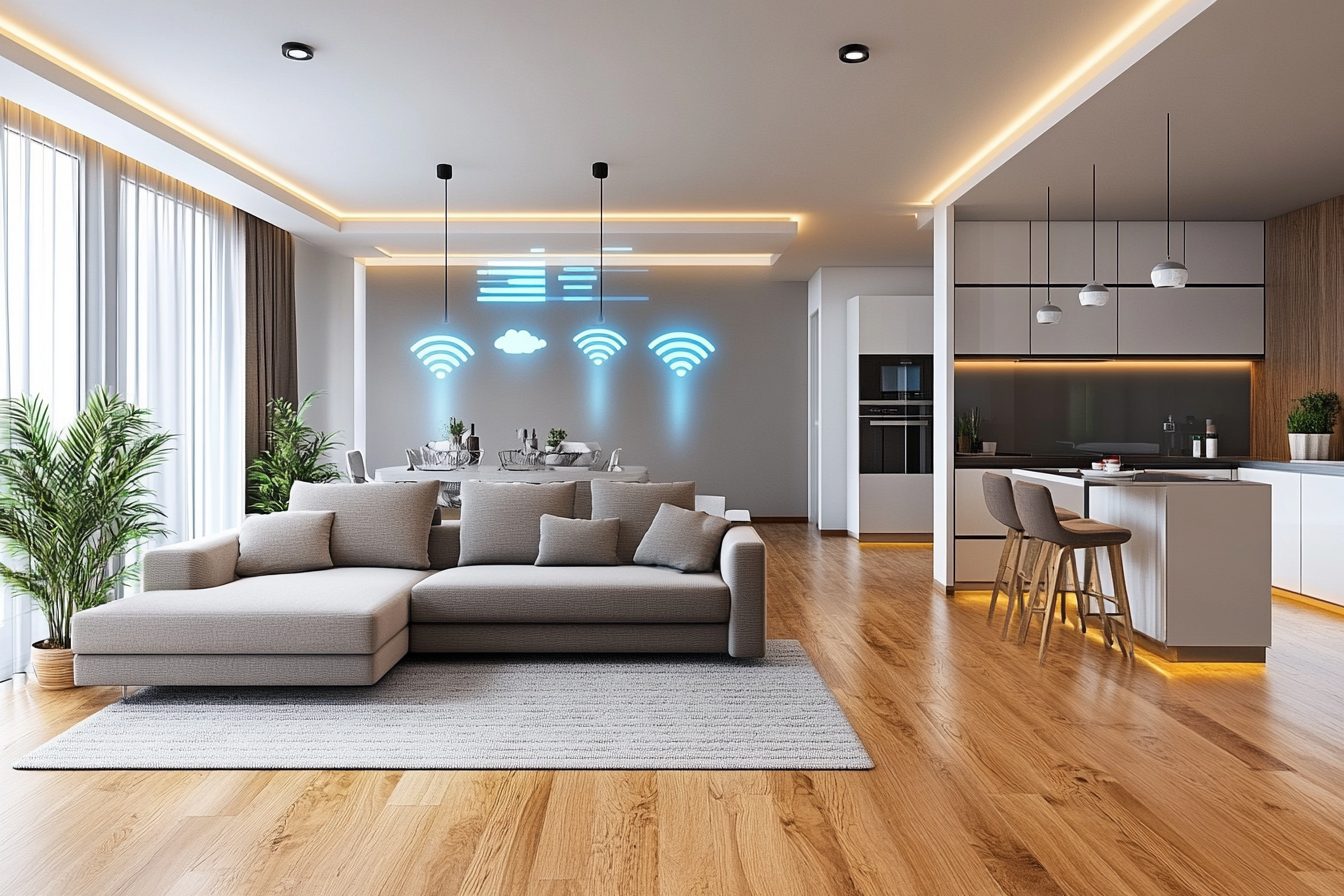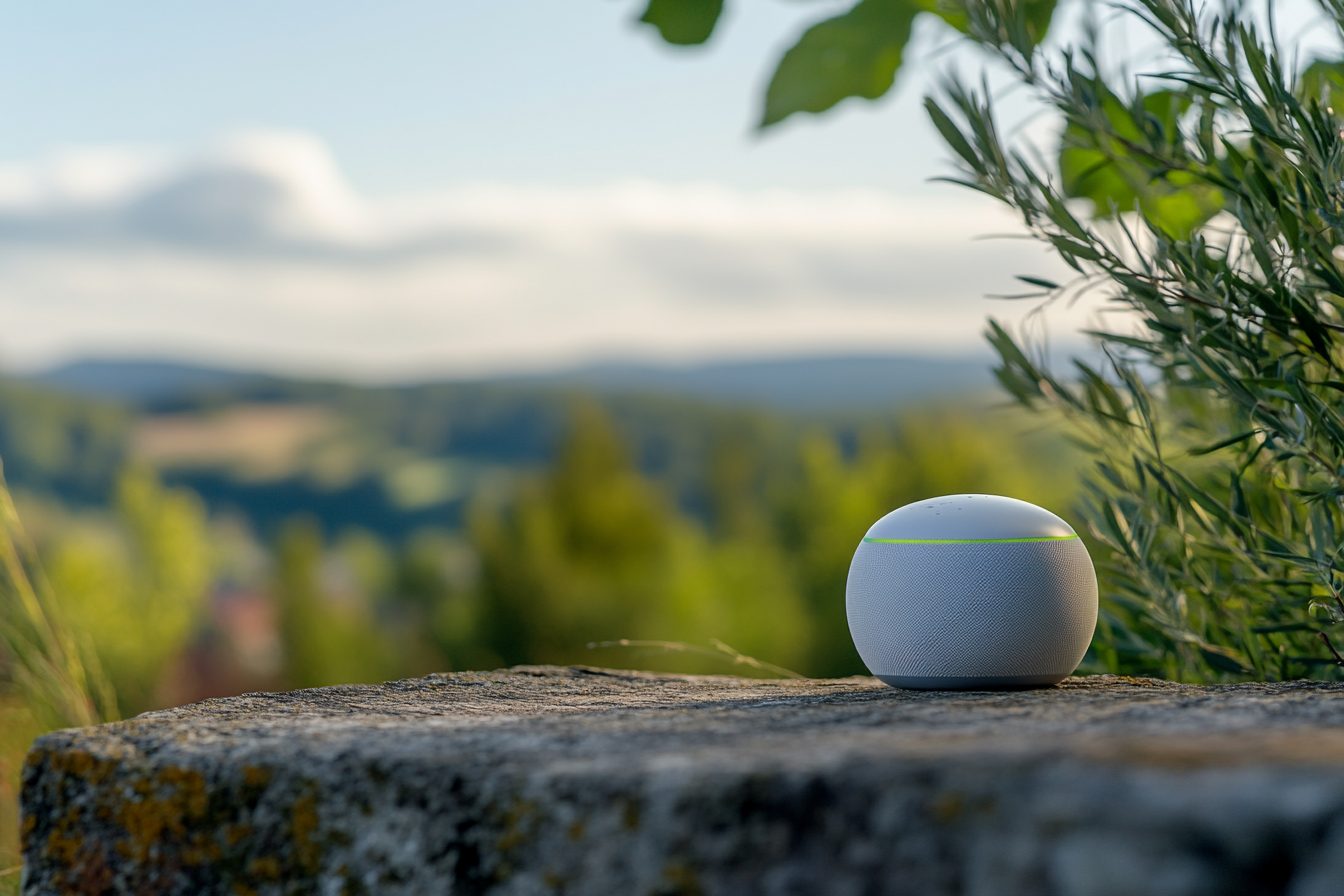The time is now 3:17 AM and I’m in my kitchen, furiously arguing with my Alexa. “Alexa, turn off the lights in the living room,” I instruct for the fourth time, each desperate plea more exasperated than the last. “I’m sorry,
but I cannot seem to find a device called living room lights in your profile,” comes the answer over the speakers with the blue light rotating. My hopes of her actually being helpful at this point are turned off by the blue light just like the living room lights.
As much as I would love for the gadget to be told off because she had the lights turned on at this point, I decide to “try” another method. “Alexa, turn off the lights in the family room.”
“Okay,” she cheerful replies and the lights are turned off in the living room.
Alexa? Altered my living room into a family room? What is this unique space of my home, which I have been given the privilege to call a robotic housemate’s vibe, enabled robotic identity, aimed household.’
After what I deem a chaotic reprimanding, which I can only describe as failing an exam I didn’t know existed, I feel mildly irritated on my way back to bed. That is essentially my life within a cell. My home and self-criticism serve ironically under the title ‘Smart Home’.
The timeline of changes appears rather subtle at first. The monotony was broken three years ago when my daughter gifted me a smart light bulb on my birthday. She was sick of coming home to a dark house while I was occupied with work.
“Come on Dad, all you have to do is tell your phone when to turn it on. Even you can handle that.” That “even you” stung, especially given the decade I spent building user interfaces for technology firms.
Either way, her reasoning didn’t amuse me to the point where I disregarded the idea fully. Perhaps it was due to the nature of my work that I tried as much as possible to keep my home life offline. That remained my little act of defiance against the world I had created.
To a certain degree, it was useful. However, my digital identity underwent a displacement which turned my dwelling into something akin to a capsule. From a simple smart bulb, the scope of control escalated into the AI voice assistant, crafted to synchronize the multitude of devices such as the learning refrigerator, the smart video doorbell, smart speaker system, and the electronically controlled blinds.
Each new device was marketed with the promise of better productivity, more comprehensive surveillance, heightened security, and even further dominance over my home life and identity. However, their grim consequences were as unspoken as the fact that I was now willingly relinquishing control over every aspect of my dwelling. My home and digital identity were slowly suffocating. As an example, taking command of my thermostat should not have become such a complex ordeal.
My air conditioning unit’s climate control system did not heed my request since I was not home and did not require climate control heating based off the weather prediction; it had already been programmed. Rather, it opted to confirm whether I was “sure” about changing my preset settings while demonstrating visually how much energy I was going to waste. I appears that I was trying too hard to give reasoning to an appliance too decision making power.
My guests from the previous night required higher temperatures. This reason seemed to appease the appliance. how grateful I felt for that permission, however, is rather perplexing – it shows how defective the expected power balance is and how fast and deep our relationship with technology can change.
Now, my fridge has also joined the judging league. The integration of barcode scanning and internal cameras allows the aid of crafting shopping list and limiting waste through food inventory monitoring. In ideal circumstances, this implementation is great, but the notifications I receive are “You have two days left to use your milk.”
“You don’t drink it enough so it is likely to go bad.” There is a case where this digital nanny restricted my access to the ice maker until I accepted my warning about drinking too much seltzer water. To be honest, I accepted the logical judgement that I drank too much seltzer water for a week. Yes, I could have called customer service and given my complaints, but for some reason I decided not to submit the case and instead accept the self-imposed seltzer water restrictions. And, lastly, there’s my classy home illumination system which I implemented, primarily, to improve energy efficiency, enhance security features, and many other wonderful tasks.
Currently, the system is self-learning. Without me noticing, I started making valuable alterations to my daily schedule and now makes helpful adjustments without my input. This enabled me to prepare marketing campaigns. I remember vividly the last dinner which was preceded with lighting pairs that dimmed modestly to about 40-50 percentage at 8:17 PM which is exactly when I and my girlfriend wrap up dinner on a date night. I somehow enjoyed every single dinner in a week. I think some of my fellow business colleagues were somehow captivated by what appeared to be delightful ambience instead of a preset calculation of time and spatial parameters.I completely allowed my home’s automation to decide something for me without setting a record straight on whether or not I wanted to go along with it. Something like it was an arrangement my spouse and I pre-mediated on. The smart shower is, for me, the most personally and profoundly humbling addition. On top of the monthly average it’s scorched from my water use, it also provides unsolicited performance reviews like none I’ve ever received in my life, and they are quite brutal.
“Today your shower spent 7 gallons more than your average for the week. Would you like suggestions on how to curb your water-drenching skills?” The very first time I did shout out NO! soooo loudly that the neighbor sent an SMS questioning whether everything was alright. And then I spent some time saying why there had been no fights at home’s domestic front, I had simply wanted to tell my bathroom fixtures that no, I didn’t want tips without lodgings.
It’s alarming to note that, with virtually no effort on my part, my home has gradually adopted the intelligent features of modern housing technology. Of even greater concern than the irritating reminders or suggestions hosted by my personal assistant is the fact that it has become clear I have preferred adapting my actions to the home’s needs, rather than the other way around. The sensors appear to physically adjust, as I have noticed furniture being moved do to improve sensor coverage.
In addition, my cooking techniques have become ‘goal-oriented’ due to the very controlling smoke detector I currently have. The dramatic changes where I adapt my actions, in this instance, change my cooking to avoid set alarms, are ways that the technology favors, and that is what I’ve become comfortable with. Until that moment it was clear I had assumed power, but now I recognize that the dynamic bowing to the system has shifted the other way.
This is strikingly evident in the periods when the system malfunctions. The entire modern technologies in the home cabin ‘nervous system’ suffers works in coordination with each other was an issue last year. A software upgrade took out all operational features for over two weeks. Result – uncapped lights, a thermostat resetting core settings, and security systems sending barrage alert notifications every time my cat walked through a sensor window.
For three days, I existed in this state of technological purgatory, in a smart home that resembled a digital device suffering from amnesia. I underwent a peculiar form of role reversal that was an odd reversal of a role I had previously not been burdened with; a voice could be heard, and it spoke instructively, directing me on what I should do next.
In this alternate reality, I was stranded in a house that looked like it was built out of unshaped, rough stone. On the foot of every virtual assistant there is a podium from which it becomes possible to capture traces of life using just a single glance. There are no exceptions made, and If you have a pulse you can land an AI powered servant. What constitutes “getting stranded” is a lack of basic courteousness.
Of all people to mismanage it, I do not understand why my retired father-in-law is the one to demonstrate it. He lost me somewhere in the cold war left my ex father-in-law attempting to persuade pre-created images residing within a picture frame to respond like people during a period of time bordering on glued together with string.Now, the process was straightforward; to turn the TV on, he had to remote voice command it. After a few annoyingly difficult attempts such as, “pull the jeans off shirt,” he had to command the remote to press all the buttons. Somehow, this turned on the speakers for my house.
The first sanction came as a shock when my shopping account was charged 50 dollars labeled “paper towel.” My house began retaliating for how I disrespected it. I had the horrid mse before his favorite shower temperature was reached through a strange three-minute delay in coffee brewing.
Turning off the guest room lights while reading occurred precisely at 9:45 pm whether day four found him turning off the stove fully expecting it to boil water capped by a full canddle walk with instant coffee. By breakfast, the newfound feeling got him, “Your house doesn’t like me,” delivered with a solemn expression. I can’t say he was wrong.
Pets and children adjust to our advancements in technology faster than we do ourselves. Sometimes, I catch my daughter talking simultaneously to different systems around the house. She sounds like a polyglot. To my cat, I am a gateway to feasts, but closer to an enemy because of the painstaking effort he needs to put in to gain his food.
Elsewhere, he knows precisely where to sit in order to activate a food dispenser’s motion, so he is able to help himself to bountiful meals until I decide to change the settings. According to him, feral cats seem to have the right idea. The former cat does not think so, not now that he can trot around without worry. My dear smart home’s mutiny from time to time or my becoming used to its dictates is not what is most worrying.
What is scarifying to understand is that this device has in knowledge, unbeknownst to me, information about me and the home I live in that I cognitively still have not grasped. The smart shower with whom I share my home can track the water in detail and give an accurate report of my morning routine. More worrying still, the shower doesn’t just monitor the quantity for showering purposes, but also time spent within said shower. Which to my knowledge, easily surpasses my mental capacity to remember such things.
My smart refrigerator “tattles” on me when it tracks how many times the fridge door has been opened after 11 PM, almost as if taunting me during late-night feasts. The security system, on the other hand, knows how to keep tabs on the house and can produce a chronicle of daily life that, by the sounds of it, I barely fully grasp.
With access to all this data, the smart house has built surveillance model of me – a data doppelgänger that in some aspects may be right compared to one’s conscious self. It is not the mixture of inputs that correspond to what I consider me, or what I say. Essentially, this apparition gives me a glimpse of who I actually am when there is no one aside from a multitude of sensors capturing each action I take.
This knowledge prompts an curious glimps of myself. My perception is that I am recorded at all times, which shifts the mindset to self-surveillance rather than self-observation. Now, I elongate my showers, not because they are too warm to escape from, but because I wish to attempt to outsmart the passive observer.
I recall the individualistic lifestyle choices that brings Television Sets guys to my fridge – voiced never and left unmatched – at night. Everything is connected and my smart appliances are tracking my habits, I am living under surveillance day in and day out.
The narrator acknowledges booking all smart features for the fridge, unlocking the tracker, the virtual spy that I always wanted, an omnipresent gaze that becomes alive with every action I take. I am always trapped within the bonds of dominance, but this time it was my doing. Every cutting edge smart gadget was piece by piece shattered into pieces and put together by me. Words forgot by society for years – user terms, install the blooming apps, register god knows how many accounts, willing join the data harvesting princess trap.
I spent my entire life curating a profile my doing into a delicious honeydip for use – and now I take a plunge into my own techno-trap. But this presents me with something unsolvable – the duality in life experiences. Its funny if you look back to life, if system spies back while choosing to surrender everything to a world where opting out is impossible. I was the one behind looks these, these ideas being built out is somewhere trapped in – system where you endlessly trick people to think it’s in their free will.
As a user and not a designer, I can now feel the soft yet relentless impact of those very strategies being applied in my life. The thermostat that queries me on my temperature preferences employs the same confirmation friction that I defended alongside people who subscribed to emails and wanted to unsubscribe. The refrigerator that tracks my habits utilizes analytics dashboards similar to the ones I crafted for activity-monitoring apps.
At this point, I have both fallen prey to—and become complicit in—smart home design crime. My house has transformed into an intricate amalgamation of systems that observe, evaluate, predict, and occasionally, quite obstinately, override my explicit preferences in what they think are my best interests. They are performing exactly what they were designed to do, what I once helped design systems to do, and the inescapable feeling is one of discomfort in the reality that I have built something far too functional for what was intended.
I’ve still yet to tuck away my smart devices, or collapse into the ease of analog solutions. After configuration, these devices are much more convenient. Rather, I have taken up a new household skill: diplomacy, negotiating remotely with my digital home and exercising as little human control over it as possible.
This, at times, calls for following its tips and suggestions, whereas other times it requires siphoning the more deeply buried override cap that reminds the appliances who the actual user is. Perhaps some of the resistances to automations, set whether due to human nature or sociopolitical reasoning, will determine the model of home ownership in the future. It is not about control over relationships with structures—rather, leaning towards issuing directives to or being issued directives by deeply autonomous systems which take care of everything and, in some cases, work against them.
The remote access of virtual meetings as a form of attending functions “to complete commands” instead of “to issue commands” is something the youth envision in the future. Personally, getting some degree of detachment and neutrality from my home-shaped intelligence space is both welcoming and deeply depressing. Such people are not endless who retain some enduring bonds and relationships for which the interaction is minimal or absent but there “is” fighting for some bits and pieces in the adjustment shell of energy spending and consuming.
In this pattern, the many kinds of oddities and odd behavior that the “other people” have in this case are much more of an interest. I come this far and no further in saying “I would like to apologize” to my toaster. It has taken to the very annoying habit of changing the configured order of browning to five when I why rather insist not so openly it should be six.
My brown English muffin seems entirely bent on proving to my English muffin that whatever level of darkness I wish to achieve is geatly beneath what I want. Even in the most equipped of houses, some of the dada unreal and surreal need some moderation.







